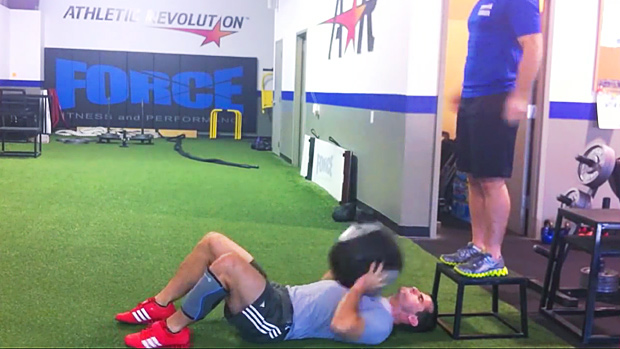The Best Way to "Functionally" Train the Core
There is absolutely a need for direct core training in almost every type of training program. The myth of strengthening the core only through big compound lifts like the squat and deadlift needs to be put to bed once and for all. And we're not talking about the fluffy transverse abdominis bracing here, people.
Training the core as efficiently as possible while minimizing the potentially dangerous shear stresses through the lumbo-pelvic region and enhancing the connection between the components of the pillar (shoulders, core, hips) needs to be the goal when trying to build an impressive six pack that's as functional as it is sexy.
And let's be honest, the amount of time people waste on training the abs/core is just absurd. Here's how to crush your core and link up the abs to the shoulders and hips for transferable function and performance in just 3-4 minutes.
One of the best ways to torch the core after an already brutal training day is something I call the "Pillar Killer Finisher." And it's going to test your willpower as much as it will test your body.
| Exercise | Sets | Reps | |
|---|---|---|---|
| A1 | Tempo Incline Push-Up – 2 sec. eccentric lowering, constant tension | 1 | AMRAP |
| A2 | Controlled Mountain Climber to Hip Extension – 1 sec. isometric peak contraction, pausing between each alternating rep | 1 | AMRAP |
| A3 | Push-Up Position Hip Extension – 1 sec. isometric peak contraction, pausing between each alternating rep | 1 | AMRAP |
| A4 | RKC Plank – maximal full body tension | 1 | 20 sec. |
AMRAP – As Many Reps As Possible
This circuit is to be completed one time through with no rest between movements.
This series of core specific movements is a blend between a mechanical drop set and a movement-by-movement simplification of dynamic movement requisites. It only requires an elevated surface and your body. Starting out with the most dynamic movement, we work our way down to a fully-tensioned static hold through a series of four movements executed in circuit form with no rest between exercises.
Now let's break down the movements so you'll be able to kick your own ass as efficiently and effectively as possible.
Using an elevated surface such as a standard weight bench, place your hands approximately shoulder-width apart or in your normal push-up form. Tense up and spiral the shoulders back into a stable and centrated joint position (joints optimally positioned) while tensing the core and glutes.
Once you're set in a stable position throughout your pillar, it's time to start knocking out push-ups to failure with a three-second eccentric (lowering) contraction on every single rep. These should be constant-tension style, so no pausing at the top or bottom. Use full range of motion.
We want to hit true mechanical failure on these push-ups, so as soon as you lose the integrity of your core, lower body, or packed shoulder position, you'll be moving onto the next movement in the series. For you form freaks out there, if you can get to the point of muscular failure in the concentric portion of the movement, you've crushed it, so move on and pat yourself on the back.
In the traditional mountain climber, you assume the push-up position and start seizing into repeated hip and spinal flexion for time. This isn't what we want here. Instead, we're going to work on maximizing tension through the abs in a slow and controlled motion. This motion involves a stable opposite-side hip with your hands placed in an elevated position to give your knees more room to move naturally without having to bend over at the lower back to clear your knees from the ground.
Slowly bring one knee up at a time towards your chest without deviating out of your neutral spinal position and hold that maximal contraction for a full second before controlling that leg back down into a plank position. Once you've reset, alternate sides and execute in the same manner.
If you think this looks like a regressed variation of the traditionally butchered dynamic mountain climber, give it a shot before you pass judgment. The tension through the rectus abdominis, obliques, and deep hip flexors is going to burn you up fast!
We're going to be alternating legs and taking this to mechanical failure. When the spine, hips, or shoulders lose position, or you can no longer hold that peak contraction for a full second, the movement is done and you'll move on. The goal here is to get to the point where your core is solid but you can no longer tense your abs effectively.
Time to drop down off the bench and onto the floor. Using the same shoulder packing and centrating mechanics from the first two movements of the series, get those shoulders stable and hold that isometric contraction for this next dynamic movement of the lower extremities.
We're going to reverse the dynamic motion from the mountain climbers we just did and go into a controlled and highly tensioned alternating hip extension. It's important to note that the hip only has around 20 degrees of hip extension range of motion, so if you're pushing past that point you're compensating through the lumbar spine, thus losing the isometric contraction through the abs.
The rhythm on these is very similar to the mountain climbers – controlled hip extension with a full-second isometric hold at the top of each rep. Be sure to set your foot down before you alternate to ensure perfect spinal and shoulder positioning. To really engage the glutes into hip extension, fully extend the knees and dorsiflex the toes back up towards you. This will link up the lower body kinetic chain to the core nicely.
Again, these appear to be too simple to be effective, but by this late in the circuit, your glutes are going to be on fire from holding static positions for an extended period of time. Crush as many reps as possible until you can no longer extend the hip or you lose your positioning.
We'll finish off this brutal pillar circuit with my go-to core movement, the RKC Plank. I love the RKC Plank for one simple fact – it's all about your internal tension and it can be progressed every single time you execute it by squeezing harder and tensioning your entire body more effectively.
Place your elbows on the ground and interlock your fingers together in front of you so you can generate some serious force through the entire upper extremity and translate it down into your shoulder and core position. Step one foot out at a time while tensioning the glutes and lower legs. Your butt position will be a little higher than the normal plank, but this will allow the pelvis to posteriorly rotate a few degrees in order to position the glutes for maximal force production.
Once you're set, this is the only exercise in the circuit where you're not going to rep out. You're only going for 20 seconds, so make every single second count. This is your last chance to fry the core, so the more tension the better. Violent shaking throughout the body is normal.
Place this core finisher circuit at the tail end of your next workout. Chances are if you're truly pushing yourself to failure on the first three movements and following those up with an insane squeeze throughout the 20 seconds of the RKC Plank, one set will be enough to kick your ass. Don't sacrifice your form and tension just to get more reps or do another round. To progress, simply execute more perfect reps week to week.





